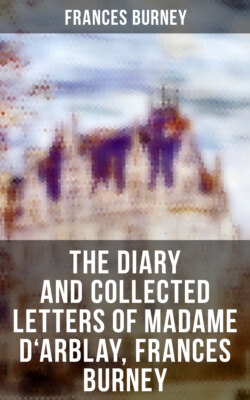Читать книгу The Diary and Collected Letters of Madame D'Arblay, Frances Burney - Frances Burney - Страница 27
На сайте Литреса книга снята с продажи.
Mr. Murphy Considers the Dialogue is Charming: a Censorious Lady
ОглавлениеAfter tea, the bishop, his lady, Lord Mordaunt, and Mrs. H— seated themselves to play at whist, and Mr. Murphy, coming up to me, said,
“I have had no opportunity, Miss Burney, to tell you how much I have been entertained this morning, but I have a great deal to say to you about it; I am extremely pleased with it, indeed. The dialogue is charming; and the—”
“What’s that?” cried Mrs. Thrale, “Mr. Murphy always flirting with Miss Burney? And here, too, where everybody’s watched!”
And she cast her eyes towards Mrs. H—, who is as censorious a country lady as ever locked up all her ideas in a country town. She has told us sneering anecdotes of every woman and every officer in Brighthelm stone. Mr. Murphy, checked by Mrs. Thrale’s exclamation, stopt the conversation, and said he must run away, but would return in half-an-hour.
“Don’t expect, however, Miss Burney,” he said, “I shall bring with me what you are thinking of; no, I can’t part with it yet!”
What! at it again cried Mrs. Thrale. “This flirting is incessant; but it’s all to Mr. Murphy’s credit.”
Mrs. Thrale told me afterwards, that she made these speeches to divert the attention of the company from our subject; for that she found they were all upon the watch the moment Mr. Murphy addressed me, and that the bishop and his lady almost threw down their cards, from eagerness to discover what he meant.
The supper was very gay: Mrs. Thrale was in high spirits, and her wit flashed with incessant brilliancy; Mr. Murphy told several stories with admirable humour; and the Bishop of Peterborough was a worthy third in contributing towards general entertainment. He turns out most gaily sociable. Mrs. H—was discussed, and, poor lady, not very mercifully.
Mrs. Thrale says she lived upon the Steyn, for the pleasure of viewing, all day long, who walked with who, how often the same persons were seen together, and what visits were made by gentlemen to ladies, or ladies to gentlemen.
“She often tells me,” said the captain, “of my men. ‘Oh,’ she says, ‘Captain Fuller, your men are always after the ladies!’”
“Nay,” cried Mrs. Thrale, “I should have thought the officers might have contented her; but if she takes in the soldiers too, she must have business enough.”
“Oh, she gets no satisfaction by her complaints; for I only say, ‘Why, ma’am, we are all young!—all young and gay!—and how can we do better than follow the ladies?’”
